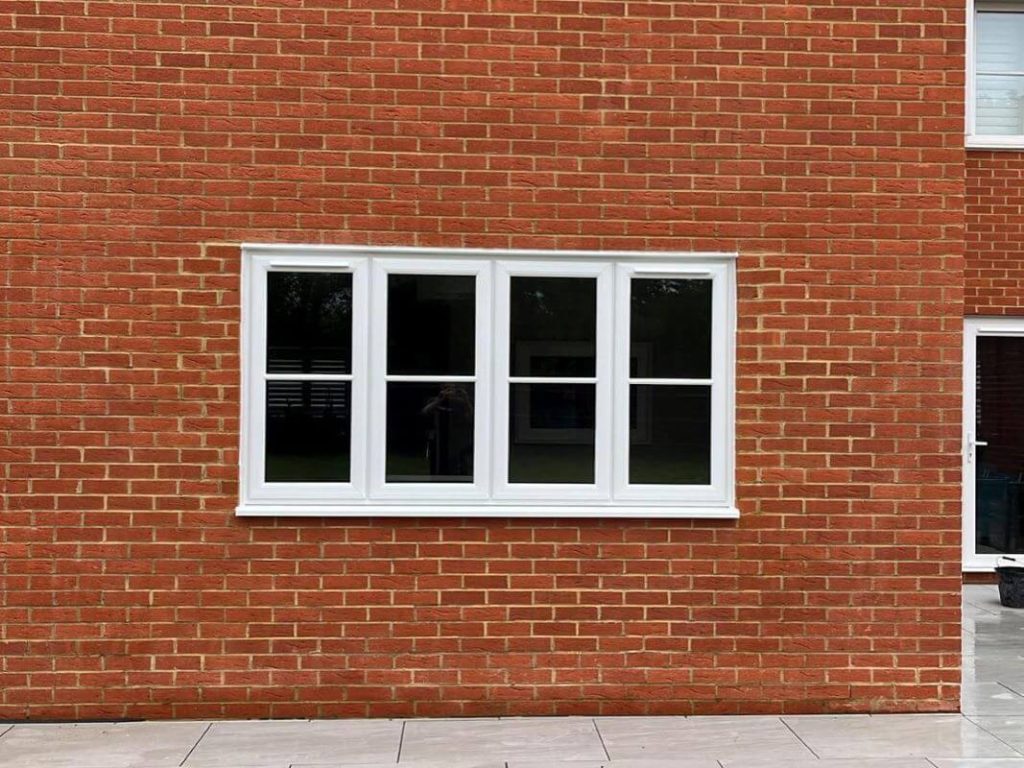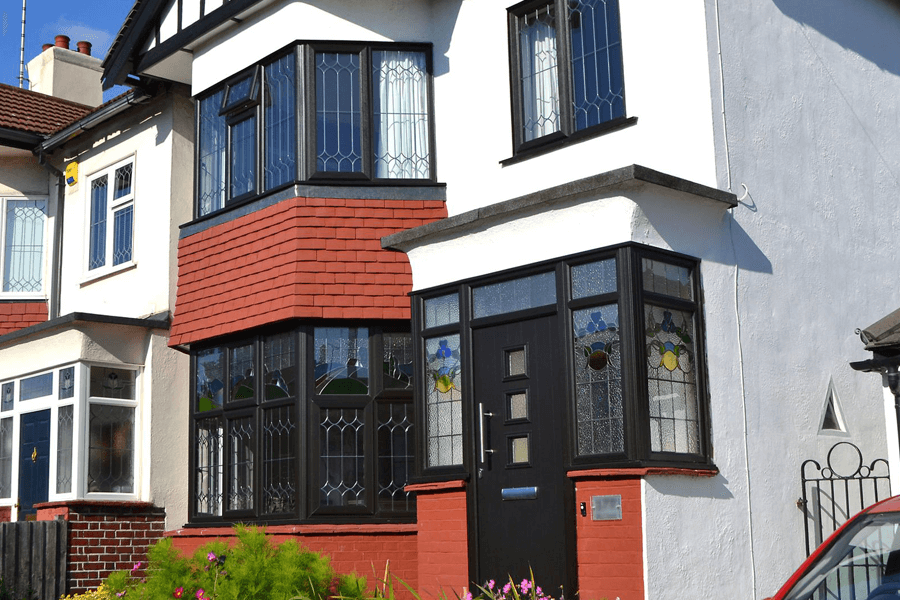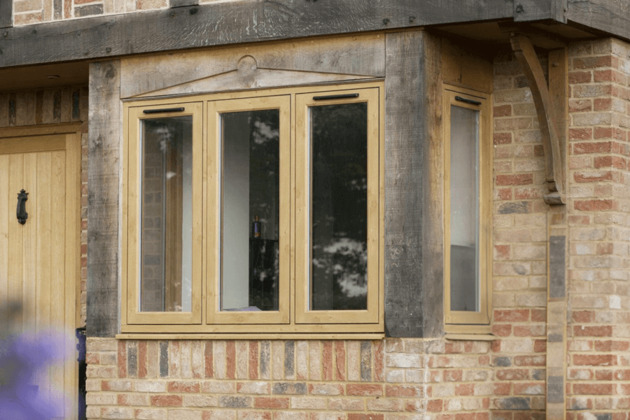When getting new windows or improving your home, budget is often a main concern. UPVC windows remain the most popular choice for UK homeowners, largely because they offer a good balance of performance and affordability.
In this guide, we’ll look at what affects the cost of new uPVC windows and what you might expect to pay.

Understanding UPVC Windows Costs
The cost of modern uPVC windows depends on several factors, from window size and style to colour and installation complexity. Understanding these elements will help you make sense of quotes and find options that match your budget.
Material Affordability: Why UPVC is Popular
UPVC (unplasticised polyvinyl chloride) is the UK’s most popular material for windows. It’s significantly more affordable than alternatives like timber or aluminium while offering excellent performance.
A standard white uPVC casement window typically costs much less than the same size window in wood or aluminium. This price difference becomes even more noticeable when replacing multiple windows throughout your home.
Beyond the initial purchase price, uPVC windows also offer long-term value through:
- Minimal maintenance requirements – no painting or treating needed
- Good durability with most windows lasting 20+ years
- Excellent insulation properties, reducing heating bills
These factors make uPVC the most cost-effective option when considering purchase price and lifetime value.
Window Style and Complexity
The style of window you choose has a significant impact on price. At BSF Windows, we offer several different styles, each with its own price implications:
Casement windows are usually the most affordable option. These simple, hinged windows open outward and are the UK’s most common style.
Flush sash windows typically cost slightly more than standard casements. Their sleek design, where the sash sits flush with the frame rather than protruding, requires more complex manufacturing.
Sliding sash windows typically cost more than casements due to their complex mechanisms and additional materials. Our uPVC versions give you the traditional look of period sash windows without the high maintenance that timber requires.
Tilt and turn windows fall somewhere in the middle price range. Their dual-opening function (tilting inward for ventilation or opening fully inward for cleaning) adds to manufacturing costs.
Bay and bow windows are typically the most expensive style due to their size and complexity. Creating a window that projects outward from your home requires more materials and installation work.
Window Dimensions and Quantities
The dimensions of your windows directly affect their cost. Larger windows require more materials and typically cost more than smaller ones. When getting quotes, you’ll find prices are usually calculated based on:
- The total number of windows needed
- The dimensions of each window
- The complexity of the installation
Replacing a small bathroom window will cost less than installing a large bay window for your living room. If you’re working with a tight budget, you might consider prioritising which windows need replacing most urgently or replacing multiple windows at once to create a single, more efficient job.
Colour and Finish Options
Standard white uPVC windows are the most affordable option. However, there’s been a growing trend toward coloured frames that better match the character of the property.
At BSF Windows, we offer a range of colours and finishes, including:
- Classic white
- Various woodgrain effects that mimic timber
- Contemporary colours like grey and black
- Dual-colour options (different colours inside and out)
Each of these options typically adds to the base price of white uPVC. Woodgrain effects are particularly popular for period properties wanting to maintain a traditional look while benefiting from modern materials.
The price difference for coloured uPVC isn’t enormous, often around 10-15% more than white, but it’s worth factoring into your budget if you’re set on a particular look.

Double Glazing Cost vs Triple Glazing Cost
The type of glazing you choose affects both performance and price. Double glazing (two panes of glass with an insulating gap) is now standard in the UK and provides good energy efficiency for most homes.
Triple glazing adds a third pane of glass and an additional insulating space, offering superior thermal performance. This extra insulation helps reduce heat loss even further, producing further energy bill savings.
At BSF Windows, we offer both double and triple glazing options. While triple glazing comes with a higher price tag, many customers find the additional cost worthwhile for the improved comfort, reduced heating bills, and added sound insulation it provides.
Professional Installation
Professional installation is essential for ensuring your new windows perform correctly and achieve a perfect fit. The installation process is just as important as the windows’ quality, affecting everything from energy efficiency to security and durability.
At BSF Windows, our installation is carried out by experienced professionals and comes with proper certification. We’re FENSA registered, which means our work complies with building regulations and comes with the necessary documentation.
Installation costs vary depending on the complexity of the job, the product, and the number of windows being fitted at one time.

Making The Right Choice for Your Home and Budget
The cost of uPVC windows varies widely depending on style, size, colour, and specification. While uPVC remains the most affordable window material for most UK homes, there’s still a significant range in pricing.
However, the investment typically pays off through improved comfort, reduced heating bills, added security, and minimal maintenance requirements over the windows’ long lifetime.
The best way to get an accurate price for your specific requirements is to arrange for a detailed assessment and quote.
Contact Us
If you’re considering new uPVC windows, we’d be happy to provide a free, no-obligation quote tailored to your needs. Our team can discuss the options and help you find the right balance of style, performance, and price.
You can do this at our Surrey showroom. We’re open Monday-Friday, 8am – 5pm and our uPVC windows are available to view and use.
For more information, you can call us on 01293 408 713, email us at bsfwindows@gmail.com, or use our online contact form.
Frequently Asked Questions
How long do UPVC windows last?
Quality uPVC windows typically last between 20-30 years when properly maintained. They don’t rot, warp, or corrode like other materials might, making them a durable choice for UK weather conditions. At BSF Windows, most of our products come with a 10 year guarantee for your peace of mind.
Are UPVC windows cheaper than aluminium?
Yes, uPVC windows are generally more affordable than aluminium alternatives. While aluminium offers some advantages like slimmer frames and potentially longer lifespan, the upfront cost is higher.
Do I need planning permission to install new UPVC windows?
Replacing existing windows with uPVC usually doesn’t require planning permission. However, there are exceptions, particularly for listed buildings or properties in conservation areas.
More From Us
The Ultimate Guide to uPVC Windows Surrey – BSF Windows
Should You Replace Old Double Glazing? Expert Advice – BSF Windows
